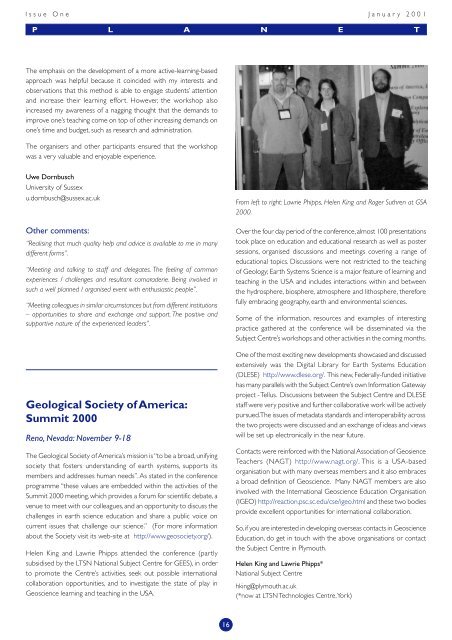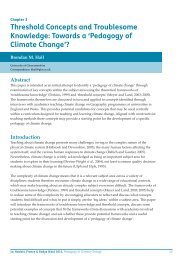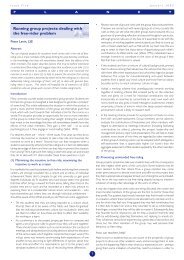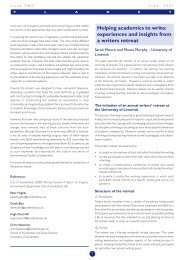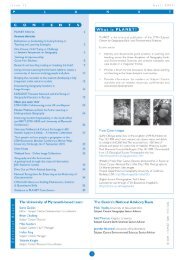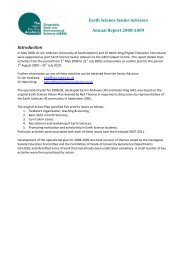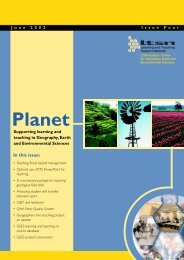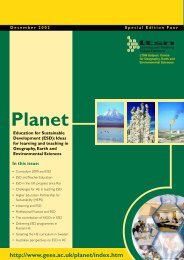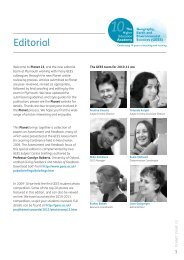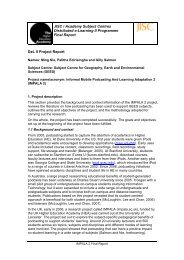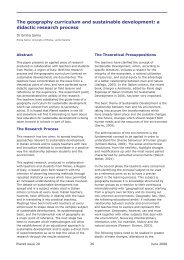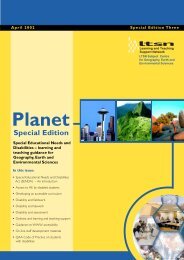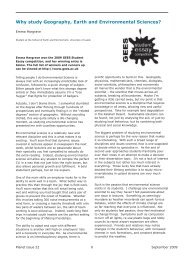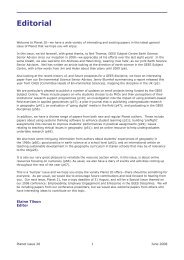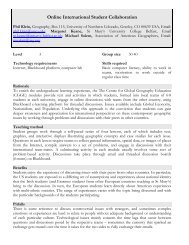Download this PDF - GEES Subject Centre Home
Download this PDF - GEES Subject Centre Home
Download this PDF - GEES Subject Centre Home
Create successful ePaper yourself
Turn your PDF publications into a flip-book with our unique Google optimized e-Paper software.
Issue One January 2001<br />
P L A N E T<br />
The emphasis on the development of a more active-learning-based<br />
approach was helpful because it coincided with my interests and<br />
observations that <strong>this</strong> method is able to engage students’ attention<br />
and increase their learning effort. However, the workshop also<br />
increased my awareness of a nagging thought that the demands to<br />
improve one’s teaching come on top of other increasing demands on<br />
one’s time and budget, such as research and administration.<br />
The organisers and other participants ensured that the workshop<br />
was a very valuable and enjoyable experience.<br />
Uwe Dornbusch<br />
University of Sussex<br />
u.dornbusch@sussex.ac.uk<br />
Other comments:<br />
“Realising that much quality help and advice is available to me in many<br />
different forms”.<br />
“Meeting and talking to staff and delegates. The feeling of common<br />
experiences / challenges and resultant camaraderie. Being involved in<br />
such a well planned / organised event with enthusiastic people”.<br />
“Meeting colleagues in similar circumstances but from different institutions<br />
– opportunities to share and exchange and support. The positive and<br />
supportive nature of the experienced leaders”.<br />
Geological Society of America:<br />
Summit 2000<br />
Reno, Nevada: November 9-18<br />
The Geological Society of America’s mission is “to be a broad, unifying<br />
society that fosters understanding of earth systems, supports its<br />
members and addresses human needs”. As stated in the conference<br />
programme “these values are embedded within the activities of the<br />
Summit 2000 meeting, which provides a forum for scientific debate, a<br />
venue to meet with our colleagues, and an opportunity to discuss the<br />
challenges in earth science education and share a public voice on<br />
current issues that challenge our science.” (For more information<br />
about the Society visit its web-site at http://www.geosociety.org/).<br />
Helen King and Lawrie Phipps attended the conference (partly<br />
subsidised by the LTSN National <strong>Subject</strong> <strong>Centre</strong> for <strong>GEES</strong>), in order<br />
to promote the <strong>Centre</strong>’s activities, seek out possible international<br />
collaboration opportunities, and to investigate the state of play in<br />
Geoscience learning and teaching in the USA.<br />
From left to right: Lawrie Phipps, Helen King and Roger Suthren at GSA<br />
2000.<br />
Over the four day period of the conference, almost 100 presentations<br />
took place on education and educational research as well as poster<br />
sessions, organised discussions and meetings covering a range of<br />
educational topics. Discussions were not restricted to the teaching<br />
of Geology; Earth Systems Science is a major feature of learning and<br />
teaching in the USA and includes interactions within and between<br />
the hydrosphere, biosphere, atmosphere and lithosphere, therefore<br />
fully embracing geography, earth and environmental sciences.<br />
Some of the information, resources and examples of interesting<br />
practice gathered at the conference will be disseminated via the<br />
<strong>Subject</strong> <strong>Centre</strong>’s workshops and other activities in the coming months.<br />
One of the most exciting new developments showcased and discussed<br />
extensively was the Digital Library for Earth Systems Education<br />
(DLESE) http://www.dlese.org/. This new, Federally-funded initiative<br />
has many parallels with the <strong>Subject</strong> <strong>Centre</strong>’s own Information Gateway<br />
project - Tellus. Discussions between the <strong>Subject</strong> <strong>Centre</strong> and DLESE<br />
staff were very positive and further collaborative work will be actively<br />
pursued. The issues of metadata standards and interoperability across<br />
the two projects were discussed and an exchange of ideas and views<br />
will be set up electronically in the near future.<br />
Contacts were reinforced with the National Association of Geosience<br />
Teachers (NAGT) http://www.nagt.org/. This is a USA-based<br />
organisation but with many overseas members and it also embraces<br />
a broad definition of Geoscience. Many NAGT members are also<br />
involved with the International Geoscience Education Organisation<br />
(IGEO) http://reaction.psc.sc.edu/cse/igeo.html and these two bodies<br />
provide excellent opportunities for international collaboration.<br />
So, if you are interested in developing overseas contacts in Geoscience<br />
Education, do get in touch with the above organisations or contact<br />
the <strong>Subject</strong> <strong>Centre</strong> in Plymouth.<br />
Helen King and Lawrie Phipps*<br />
National <strong>Subject</strong> <strong>Centre</strong><br />
hking@plymouth.ac.uk<br />
(*now at LTSN Technologies <strong>Centre</strong>, York)<br />
16


